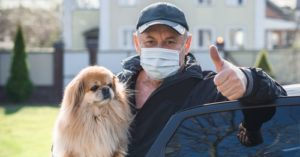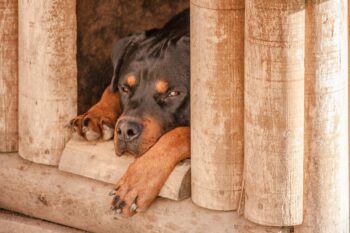
Let’s start with this…there is no cause for alarm if you are the loving parent of a pup.
With the current news coverage about COVID-19 and pets, you may be wondering what this means for your fur family. As of now, all reputable sources point to there being no risk for dogs contracting the virus.
However, there still seems to be a lot of concern for pet parents. Below are several relevant questions and answers to help you better understand the situation:
COVID-19 Q&A
- What causes COVID-19?
- Should you be concerned about pets spreading COVID-19?
- Should pets of people with confirmed cases of COVID-19 be tested?
- Can pets serve as a reservoir of the virus and pass it back to us or on to others?
- What precautions can pet owners sick with COVID-19 take?
- If pets are found to become infected with COVID-19, will they have to be quarantined?
- If you have people in the same house—some quarantined, some not—can pets visit both?
- What should you be doing right now to protect your pets?
- Is there a COVID-19 vaccine for dogs and cats?
1. What causes COVID-19?
Coronaviruses (CoV) are a family of RNA (ribonucleic acid) viruses. They are called coronaviruses because the virus particle exhibits a characteristic ‘corona’ (crown) of spike proteins around its lipid envelope. CoV infections are common in animals and humans. Some strains of CoV are zoonotic, meaning they can be transmitted between animals and humans, but many strains are not zoonotic.
In humans, CoV can cause illness ranging from the common cold to more severe diseases such as Middle East Respiratory Syndrome (caused by MERS-CoV), and Severe Acute Respiratory Syndrome (caused by SARS-CoV). Detailed investigations have demonstrated that SARS-CoV was transmitted from civets to humans and MERS-CoV from dromedary camels to humans. – World Organisation for Animal Health
2. Should you be concerned about pets spreading COVID-19?
While this virus seems to have emerged from an animal source, it is now spreading from person-to-person. There is no reason to think that any animals, including pets in the United States, might be a source of infection with this new coronavirus.
To date, CDC has not received any reports of pets or other animals becoming sick with COVID-19. At this time, there is no evidence that companion animals, including pets, can spread COVID-19. However, since animals can spread other diseases to people, it’s always a good idea to wash your hands after being around animals. – Center for Disease Control & Prevention (CDC)
3. Should pets of people with confirmed cases of COVID-19 be tested?
That’s not everybody’s top priority right now. It should be discussed, however, if we start seeing more cases like the Hong Kong Pomeranian. – Shelley Rankin, microbiologist at University of Pennsylvania School of Veterinary Medicine
4. Can pets serve as a reservoir of the virus and pass it back to us or on to others?
If pets can become infected—and we don’t know if they can—then yes, they could serve as a reservoir. And in that case, we’d need to deal with them the same way we’re dealing with human cases. We’d need to figure out how to treat them. Like human hospitals, vet hospitals would have to be prepared for a surge in the number of cases. – Shelley Rankin, microbiologist at University of Pennsylvania School of Veterinary Medicine
It’s possible that a person with COVID-19 could sneeze or otherwise contaminate their pet, and then another individual could touch that animal and contract the disease. Veterinary experts believe the risk of transmission would be low. However, animals living with sick individuals should be kept away from other people and animals (quarantined at home), just as people who live with ill individuals must avoid contact with others. – University of Illinois College of Veterinary Medicine
5. What precautions can pet owners sick with COVID-19 take?
There have not been any reports of a companion or other animals becoming sick with COVID-19. Currently, there is no evidence that they play a significant epidemiological role in this human disease. However, because animals and people can sometimes share diseases (known as zoonotic diseases), it is still recommended that people who are sick with COVID-19 limit contact with a companion and other animals until more information is known about the virus.
When handling and caring for animals, basic hygiene measures should always be implemented. This includes hand washing before and after being around or handling animals, their food, or supplies, as well as avoiding kissing, licking, or sharing food.
When possible, people who are sick or under medical attention for COVID-19 should avoid close contact with their pets and have another member of their household care for their animals. If they must look after their pet, they should maintain good hygiene practices and wear a face mask if possible. – World Organisation for Animal Health
6. If pets are found to become infected with COVID-19, will they have to be quarantined?
Yes, just like humans, some might be quarantined at a hospital. Or a shelter. Or even a doggy daycare. If they had the virus but weren’t sick, you could quarantine them at home. You’d want to limit your contact with them. Perhaps keep them in a bedroom away from other people and animals. You’d want to wash your hands frequently, and maybe wear a mask when you entered the room. – Shelley Rankin, microbiologist at University of Pennsylvania School of Veterinary Medicine
7. If you have people in the same house—some quarantined, some not—can the pet visit both?
No. Out of an abundance of caution, the answer should be no. – Shelley Rankin, microbiologist at University of Pennsylvania School of Veterinary Medicine
8. What should you be doing right now to protect your pets?
It is important to include pets in your family’s preparedness planning. If you get sick and are quarantined, you should make sure you have extra pet food on hand. And you should make your neighbors aware of any feeding, walking, or medications that your pets need in case you can’t make it back home. Get prepared now. – Shelley Rankin, microbiologist at University of Pennsylvania School of Veterinary Medicine
There is no need for your pet to wear a face mask. It likely will not protect them from disease transmission and may cause breathing difficulties. – University of Illinois College of Veterinary Medicine
9. Is there a COVID-19 vaccine for dogs and cats?
There is no vaccine for COVID-19 for at this time, but veterinarians are familiar with other coronaviruses. Similar but different coronavirus species cause several common diseases in domestic animals. Many dogs, for example, are vaccinated for another species of coronavirus (Canine Coronavirus) as puppies. However, this vaccine does not cross protect for COVID-19. – University of Illinois College of Veterinary Medicine
The post Coronavirus (COVID-19): What Pet Parents Need To Know appeared first on iHeartDogs.com.
from iHeartDogs.com https://ift.tt/2IX2XOR https://ift.tt/2Qoy1uN

No comments:
Post a Comment